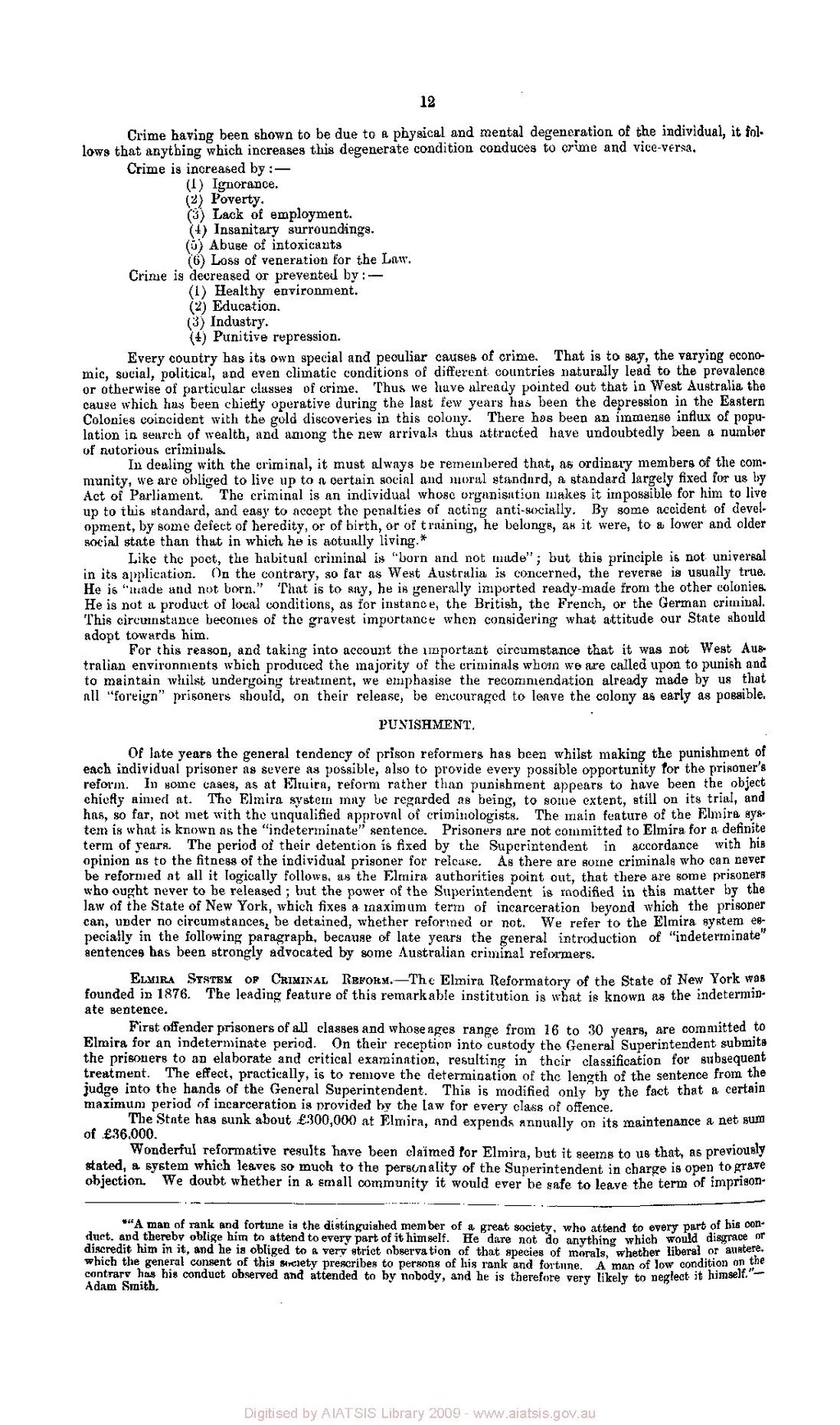12
Crime having been shown to be due to a physical and mental degeneration of the individual, it follows that anything which increases this degenerate condition conduces to crime and vice-versa.
Crime is increased by:—
- (1) Ignorance.
- (2) Poverty.
- (3) Lack of employment.
- (4) Insanitary surroundings.
- (5) Abuse of intoxicants
- (6) Loss of veneration for the Law.
Crime is decreased or prevented by:—
- (1) Healthy environment.
- (2) Education.
- (3) Industry.
- (4) Punitive repression.
Every country has its own special and peculiar causes of crime. That is to say, the varying economic, social, political, and even climatic conditions of different countries naturally lead to the prevalence or otherwise of particular classes of crime. Thus we have already pointed out that in West Australia the cause which has been chiefly operative during the last few years has been the depression in the Eastern Colonies coincident with the gold discoveries in this colony. There has been an immense influx of population in search of wealth, and among the new arrivals thus attracted have undoubtedly been a number of notorious criminals.
In dealing with the criminal, it must always be remembered that, as ordinary members of the community, we are obliged to live up to a certain social and moral standard, a standard largely fixed for us by Act of Parliament. The criminal is an individual whose organisation makes it impossible for him to live up to this standard, and easy to accept the penalties of acting anti-socially. By some accident of development, by some defect of heredity, or of birth, or of training, he belongs, as it were, to a lower and older social state than that in which he is actually living.∗
Like the poet, the habitual criminal is "born and not made"; but this principle is not universal in its application. On the contrary, so far as West Australia is concerned, the reverse is usually true. He is "made and not born." That is to say, he is generally imported ready-made from the other colonies. He is not a product of local conditions, as for instance, the British, the French, or the German criminal. This circumstance becomes of the gravest importance when considering what attitude our State should adopt towards him.
For this reason, and taking into account the important circumstance that it was not West Australian environments which produced the majority of the criminals whom we are called upon to punish and to maintain whilst undergoing treatment, we emphasise the recommendation already made by us that all "foreign" prisoners should, on their release, be encouraged to leave the colony as early as possible.
PUNISHMENT.
Of late years the general tendency of prison reformers has been whilst making the punishment of each individual prisoner as severe as possible, also to provide every possible opportunity for the prisoner's reform. In some cases, as at Elmira, reform rather than punishment appears to have been the object chiefly aimed at. The Elmira system may be regarded as being, to some extent, still on its trial, and has, so far, not met with the unqualified approval of criminologists. The main feature of the Elmira system is what is known as the "indeterminate" sentence. Prisoners are not committed to Elmira for a definite term of years. The period of their detention is fixed by the Superintendent in accordance with his opinion as to the fitness of the individual prisoner for release. As there are some criminals who can never be reformed at all it logically follows, as the Elmira authorities point out, that there are some prisoners who ought never to be released; but the power of the Superintendent is modified in this matter by the law of the State of New York, which fixes a maximum term of incarceration beyond which the prisoner can, under no circumstances be detained, whether reformed or not. We refer to the Elmira system especially in the following paragraph, because of late years the general introduction of "indeterminate" sentences has been strongly advocated by some Australian criminal reformers.
Elmira System of Criminal Reform.—The Elmira Reformatory of the State of New York was founded in 1876. The leading feature of this remarkable institution is what is known as the indeterminate sentence.
First offender prisoners of all classes and whose ages range from 16 to 30 years, are committed to Elmira for an indeterminate period. On their reception into custody the General Superintendent submits the prisoners to an elaborate and critical examination, resulting in their classification for subsequent treatment. The effect, practically, is to remove the determination of the length of the sentence from the judge into the hands of the General Superintendent. This is modified only by the fact that a certain maximum period of incarceration is provided by the law for every class of offence.
The State has sunk about £300,000 at Elmira, and expends annually on its maintenance a net sum of £36,000.
Wonderful reformative results have been claimed for Elmira, but it seems to us that, as previously stated, a system which leaves so much to the personality of the Superintendent in charge is open to grave objection. We doubt whether in a small community it would ever be safe to leave the term of imprison-
∗2 "A man of rank and fortune is the distinguished member of a great society, who attend to every part of his conduct, and thereby oblige him to attend to every part of it himself. He dare not do anything which would disgrace or discredit him in it, and he is obliged to a very strict observation of that species of morals, whether liberal or austere, which the general consent of this society prescribes to persons of his rank and fortune. A man of low condition on the contrary has his conduct observed and attended to by nobody, and he is therefore very likely to neglect it himself."—Adam Smith.
